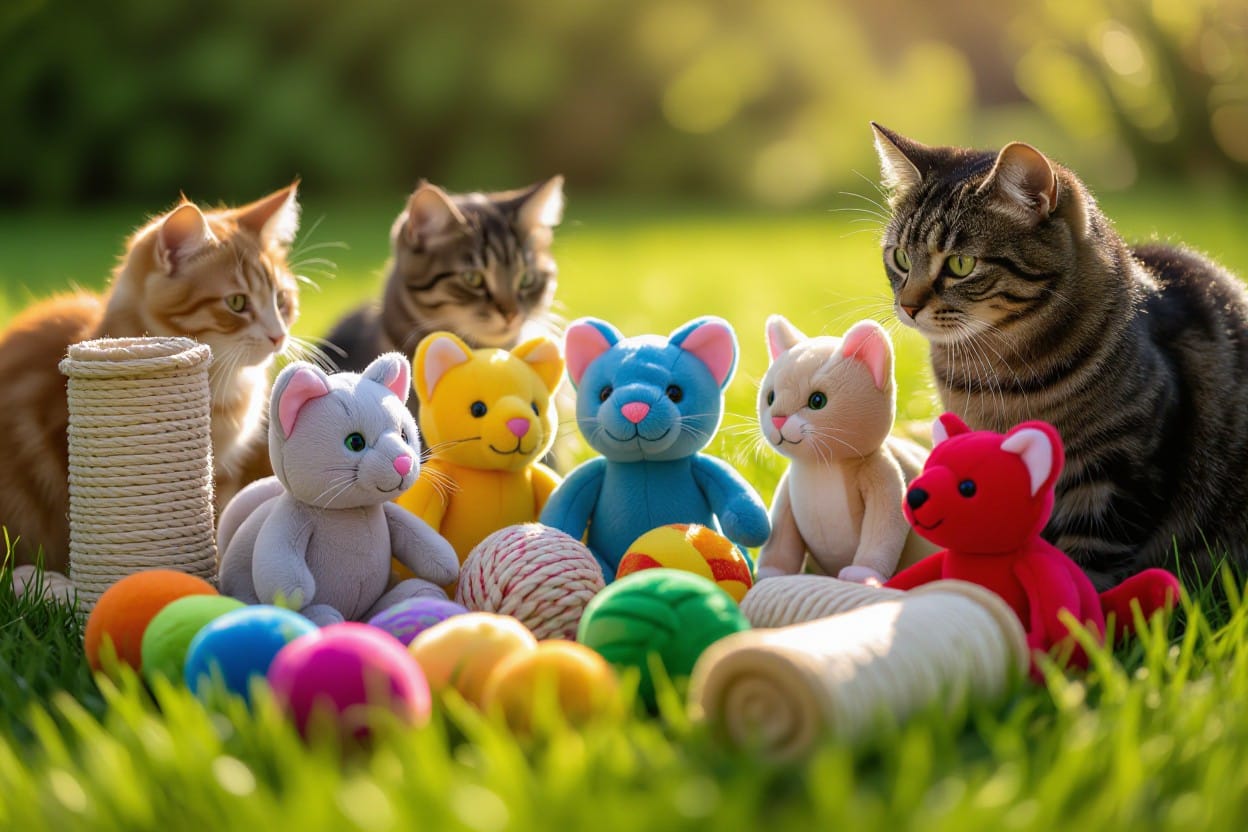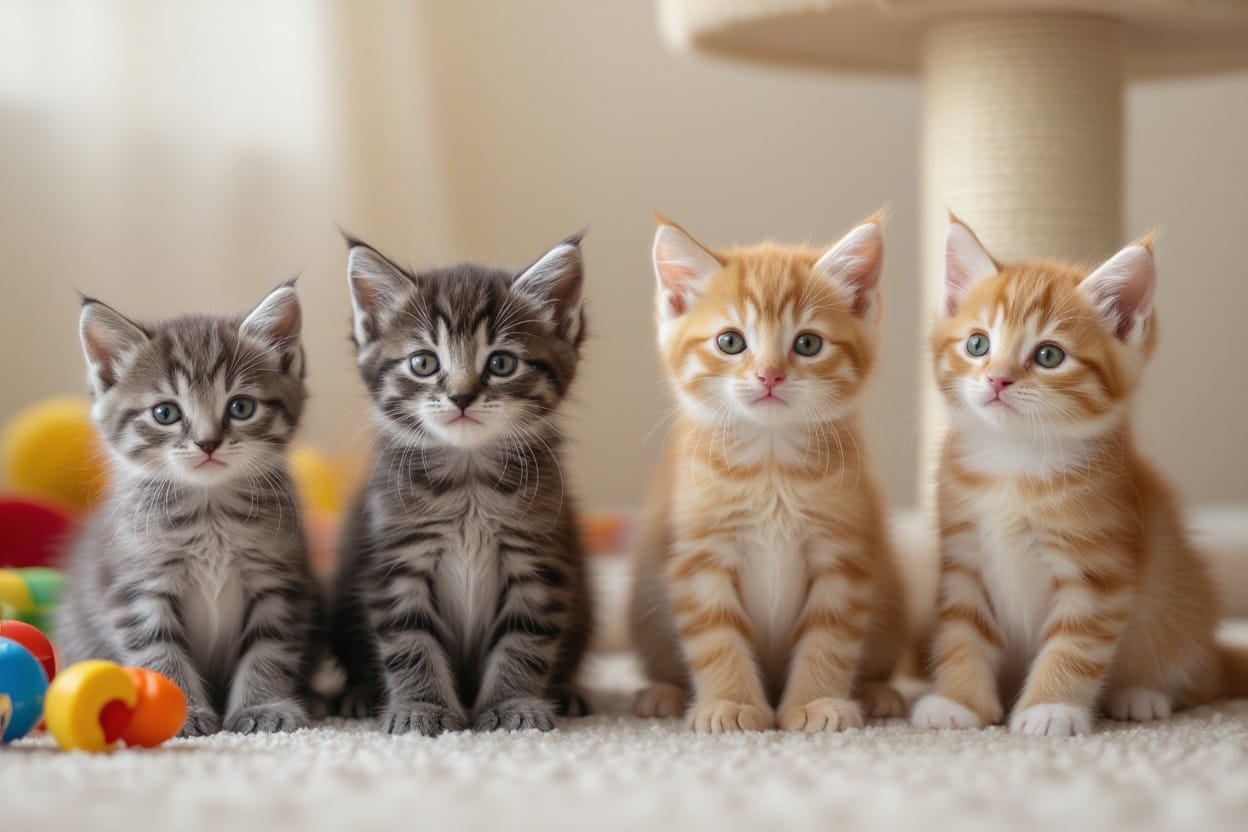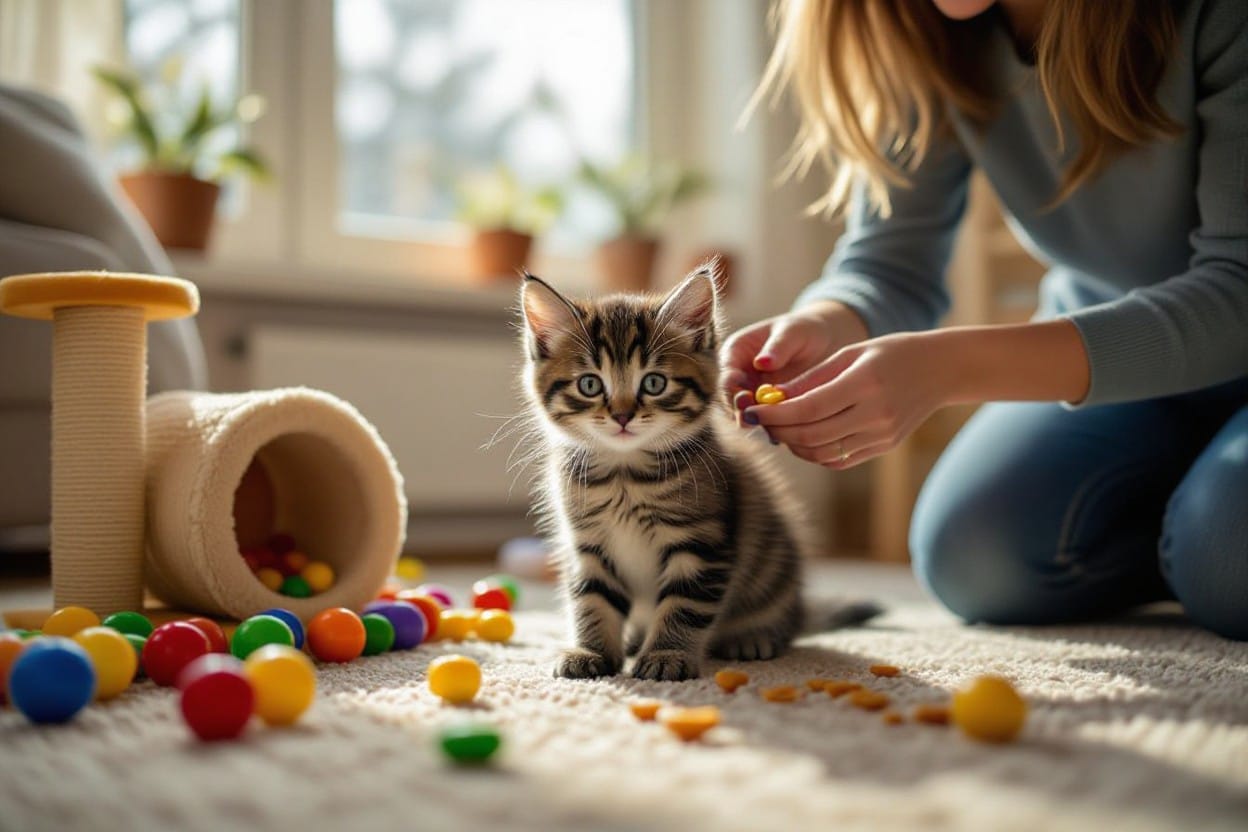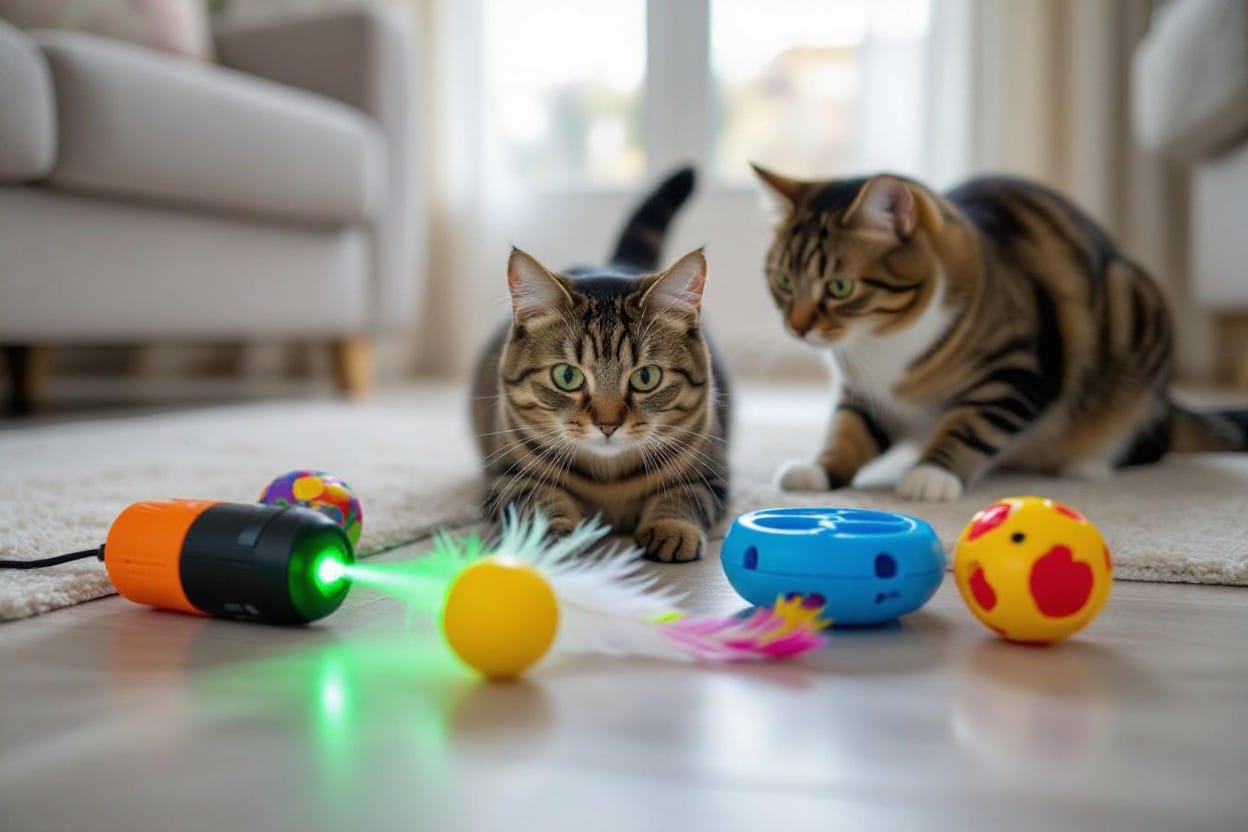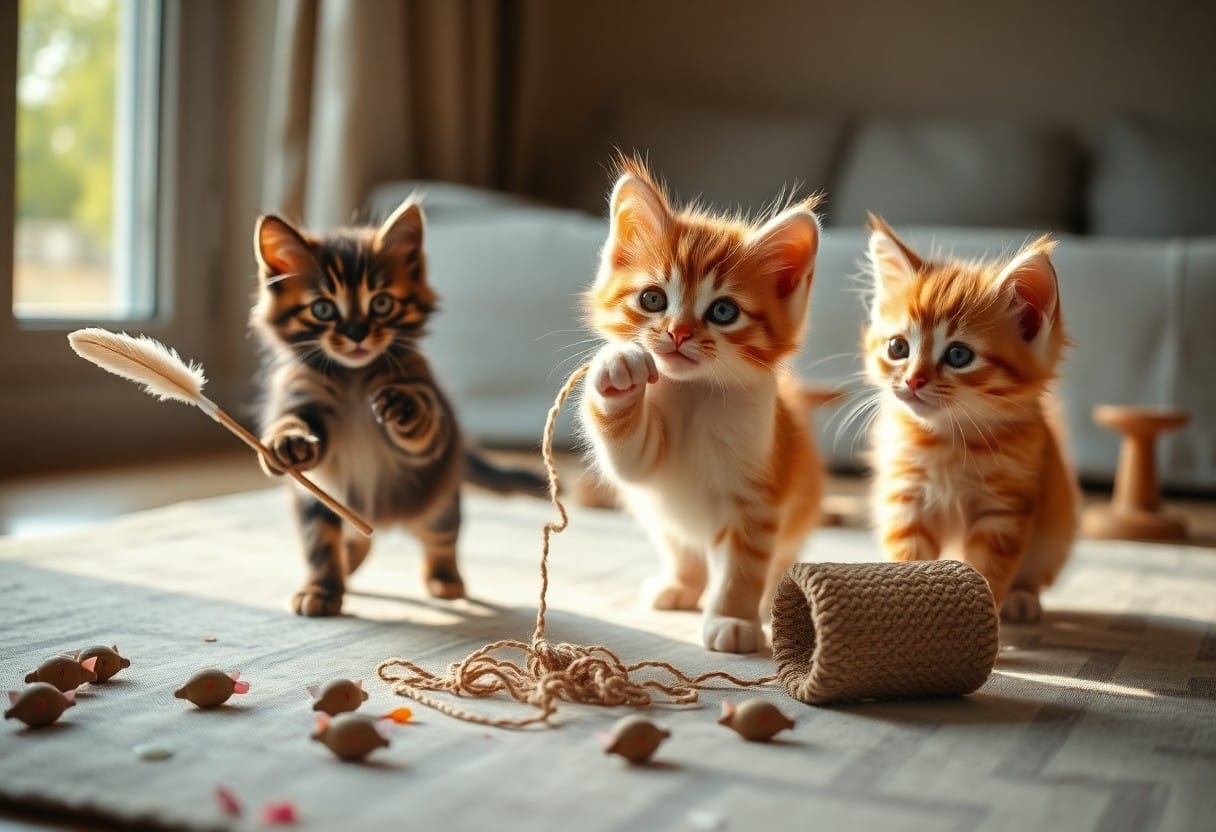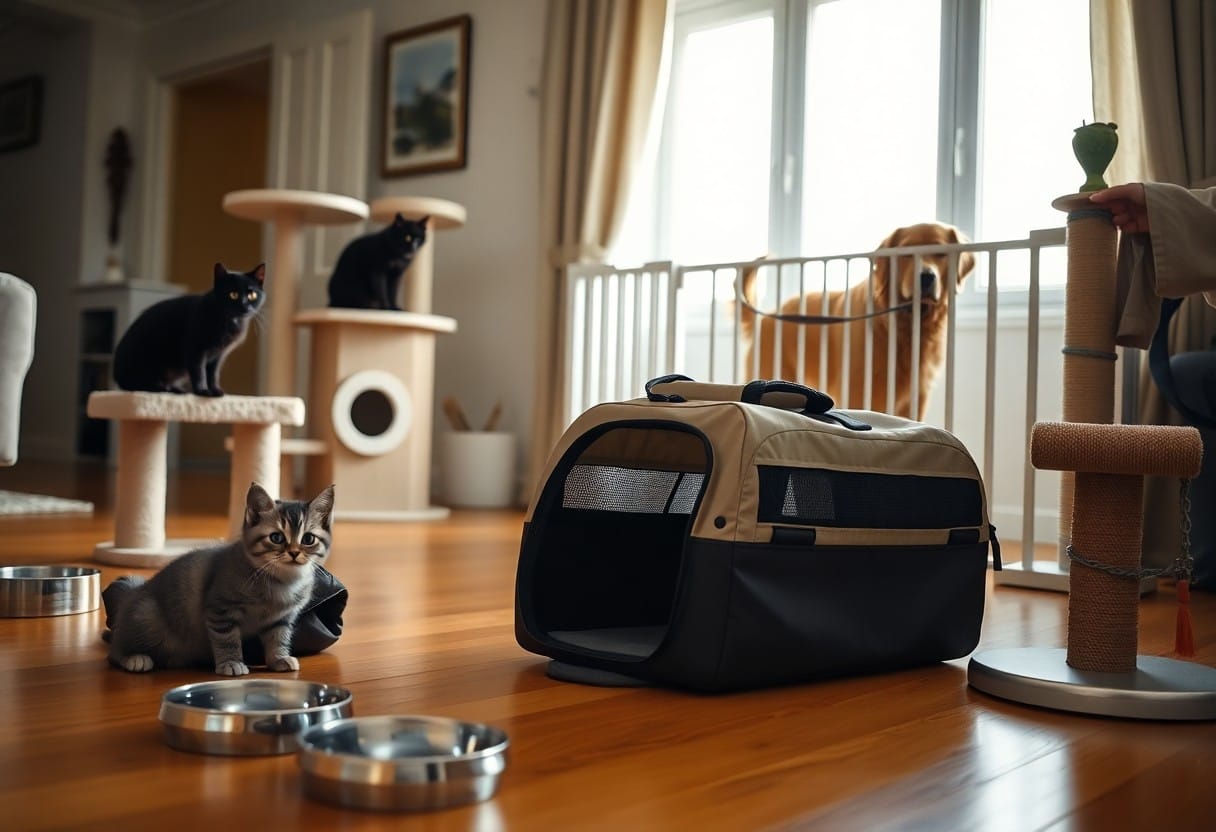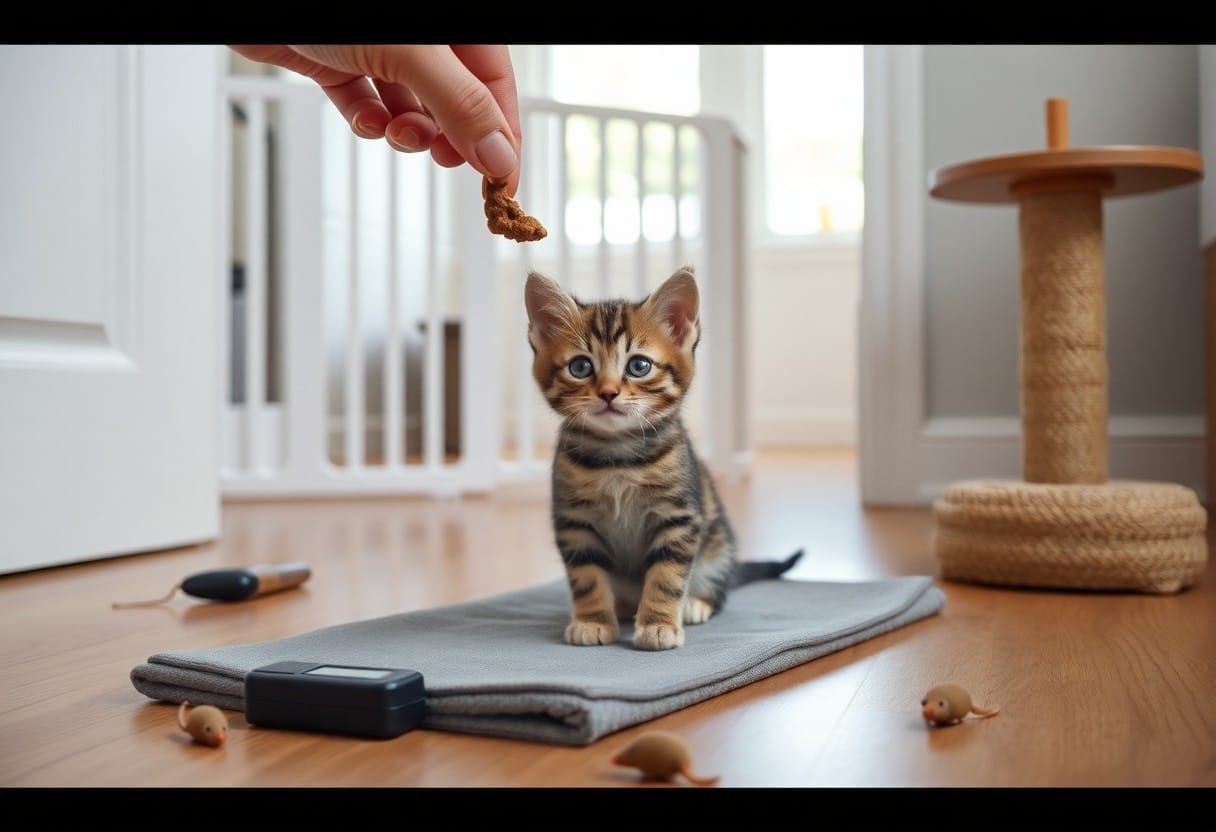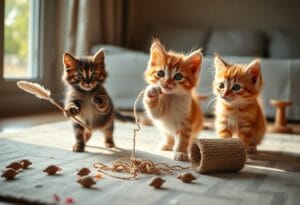Play is not just a way for kittens to pass the time, but a crucial aspect of their socialization and development. From chasing toys to wrestling with littermates, play helps kittens hone their physical and social skills. Through play, kittens learn important lessons about boundaries, communication, and problem-solving. Understanding the role of play in kitten development can help cat owners provide their furry companions with the proper environment and stimuli for healthy growth and socialization.

The Science of Play
Biological Basis for Play Behavior
Some of the most fascinating aspects of play in kittens can be traced back to their biology. Play behavior is believed to be heavily influenced by a variety of factors, including genetics, brain development, and hormonal changes. Kittens engage in play from a very young age, as early as a few weeks old, and their play behaviors are believed to be important in honing their physical coordination, hunting skills, and social interactions.
Evolutionary Advantages of Play
On an evolutionary level, play serves a crucial role in the development of kittens. It is not merely a form of entertainment; rather, it plays a vital role in their survival and adaptation to their environment. Through play, kittens learn valuable skills such as stalking, pouncing, and wrestling that are crucial for hunting prey and defending themselves in the wild. Additionally, play helps kittens establish social hierarchies and bonds within their litter, preparing them for future interactions with other cats.
More on Evolutionary Advantages of Play
Basis It is believed that the playful behaviors exhibited by kittens have been shaped by natural selection over time. Those kittens that engaged in play were more likely to survive and pass on their genes, leading to the continuation of playful tendencies in future generations. Moreover, play helps kittens to learn their physical limits, develop problem-solving skills, and build confidence in their abilities. Ultimately, play is a crucial component of a kitten’s development, contributing to their overall health and well-being.
Socialization Through Play
It is well known that play is an imperative aspect of a kitten’s social development. Through play, kittens learn important social cues that help them interact with other cats and humans throughout their lives.
Play and Learning Social Cues
Social play allows kittens to practice skills such as sharing, taking turns, and reading body language. When kittens engage in play with their littermates or human companions, they learn how to communicate through play bowing, chasing, pouncing, and wrestling.
The Role of Play in Hierarchical Structuring
Socialization through play also helps kittens establish hierarchical structures within their social groups. Through play interactions, kittens learn their place within the group and develop relationships based on dominance and submission. This is crucial for kittens to navigate social situations and establish their roles within their family or colony.
Understanding the importance of play in hierarchical structuring is imperative for kitten socialization. It helps owners create a stimulating environment where kittens can engage in play and learn valuable social skills that will benefit them throughout their lives.
Play and Physical Development
Motor Skills and Coordination
The play is a crucial component in the development of a kitten’s motor skills and coordination. Through play, kittens engage in various activities such as stalking, chasing, and pouncing, which help them refine their movements and enhance their coordination. This active play also aids in the development of muscle strength and agility, setting a foundation for their physical capabilities as they grow.
Impact on Physical Growth and Health
Coordination, balance, and strength are all enhanced through play, ultimately contributing to a kitten’s physical growth and overall health. Regular play sessions help kittens build healthy muscles and bones, maintain a healthy weight, and develop cardiovascular fitness. Furthermore, play promotes mental stimulation, reducing stress and anxiety levels, which in turn positively impacts a kitten’s immune system and overall well-being.
The motor skills honed during playtime also play a vital role in a kitten’s physical growth and development. As kittens engage in playful activities that encourage running, jumping, and climbing, they strengthen their muscles and bones, fostering a healthy physique. This physical exercise not only supports their growth but also helps prevent obesity and related health issues.

Cognitive Growth and Play
Once again, playtime for kittens is not just about physical activity; it also plays a vital role in their cognitive development. Through various forms of play, kittens can enhance their problem-solving skills, curiosity, and overall mental acuity.
Development of Problem-Solving Skills
The process of play helps kittens develop crucial problem-solving skills from a young age. Whether they are figuring out how to catch a moving toy or strategizing how to reach a higher surface during play, kittens are constantly engaging their brains. This type of mental stimulation is crucial for their cognitive growth and helps them learn how to navigate challenges they may encounter later in life.
Stimulating Curiosity and Exploration through Play
Through play, kittens are encouraged to explore their environment and satisfy their natural curiosity. Play provides them with the opportunity to investigate new objects, textures, and sounds, which are crucial for their mental development. By engaging in interactive play sessions with their toys or with other animals, kittens learn to be inquisitive and fearless in their exploration of the world around them.
Stimulating Curiosity and Exploration through Play
Through play, kittens are encouraged to explore their environment and satisfy their natural curiosity. Play provides them with the opportunity to investigate new objects, textures, and sounds, which are crucial for their mental development. By engaging in interactive play sessions with their toys or with other animals, kittens learn to be inquisitive and fearless in their exploration of the world around them.
Emotional Benefits of Play
Reducing Stress and Anxiety in Kittens
On their journey from curious kittens to confident cats, play serves as a crucial tool in reducing stress and anxiety. Through interactive play sessions with toys or other cats, kittens can release pent-up energy, lower their stress levels, and gain a sense of control over their environment. Play also helps kittens to develop their natural hunting instincts in a safe setting, boosting their confidence and reducing anxiety-related behaviors such as hiding or excessive grooming.
Play as a Way to Build Trust with Humans
Play between kittens and humans is not just about fun and games; it plays a vital role in building trust and strengthening the bond between them. When kittens engage in play with their human caregivers, they learn to associate positive experiences with human interaction. This positive reinforcement helps kittens feel more at ease around humans, leading to a deeper connection based on trust and companionship.
Emotional connections formed during play sessions create lasting impressions on kittens, shaping their attitudes towards human interactions and social relationships throughout their lives.
Types of Play and Suitable Toys
Keep playtime fun and engaging for your kitten by providing a variety of toys that cater to their natural instincts and behaviors. Different types of play help kittens develop important skills such as hunting, pouncing, and social interaction. By offering a mix of toys, you can encourage both independent play and interactive play with siblings, other animals, or humans.
| Self-Directed Play | Interactive Play |
| – Balls and small toys that can be batted around – Sock toys filled with catnip – Feathers on a stick for pouncing – Puzzle feeders for mental stimulation – Crinkle balls or toys for auditory stimulation | – Wand toys for interactive play – Laser pointers for chasing – Cat tunnels for hide-and-seek – Catnip toys for playtime – Interactive puzzle toys for mental engagement |
| – Supervise play with string or small objects that can be swallowed – Rotate toys regularly to maintain interest – Provide a variety of textures such as soft, fuzzy, and crinkly | – Monitor play sessions to prevent overstimulation or aggression – Rotate toys to keep playtime fresh and exciting – Encourage gentle play and positive interactions |
Self-Directed Play and Toy Examples
Self-directed play is crucial for a kitten’s development as it fosters independence and helps them hone their natural skills. Providing toys that encourage solo play allows kittens to explore their environment, build confidence, and stay mentally stimulated. Some toy examples for self-directed play include balls and small toys that can be batted around, sock toys filled with catnip, feathers on a stick for pouncing, puzzle feeders for mental stimulation, and crinkle balls or toys for auditory stimulation.
Recognizing the importance of self-directed play, it’s imperative to offer a variety of toys that cater to different senses and play styles. By providing an assortment of textures, sounds, and movements, you can keep your kitten engaged and entertained while promoting healthy play behavior.
Interactive Play with Siblings, Other Animals, and Humans
Types of interactive play involving siblings, other animals, and humans are imperative for a kitten’s social development. Through play sessions with their littermates or other household pets, kittens learn important social cues, practice communication skills, and establish boundaries. Interactive play with humans also helps kittens form strong bonds, build trust, and develop confidence in their interactions.
Plus, interactive play sessions provide valuable exercise for kittens, helping them stay physically fit and maintain a healthy weight. Engaging in playful activities with your kitten not only strengthens your bond but also allows you to monitor their behavior, assess their development, and address any concerns that may arise during playtime.
Creating a Stimulating Play Environment
Your kitten’s play environment plays a crucial role in their socialization and development. By creating a stimulating play space, you can help foster your kitten’s physical, mental, and emotional well-being.
Designing a Safe and Engaging Play Space
With a focus on safety and engagement, ensure that your play space is free of any potential hazards such as sharp objects, toxic plants, or small items that could be swallowed. Provide a variety of toys that encourage different types of play, such as interactive toys, scratching posts, and toys that mimic natural prey.
Balancing Structured and Unstructured Playtime
On the topic of balancing structured and unstructured playtime, it is important to provide a mix of both types of play for your kitten. Structured play can involve interactive toys that allow you to engage with your kitten in a controlled manner, while unstructured play gives your kitten the freedom to explore and play on their terms.
Balancing structured play, where you can guide and interact with your kitten, with unstructured play, where your kitten can use their natural instincts and creativity, helps provide a well-rounded play experience that supports their socialization and development.
Play Etiquette and Human Interaction
After observing kittens engage in play, it becomes evident that play etiquette is an important aspect of their development. As kittens interact with each other and their human companions, they learn valuable social skills that will aid in their communication and interactions throughout their lives. It is crucial for owners to understand the significance of play etiquette and how they can positively influence their kitten’s behavior through proper interactions.
Educating Owners on Safe Play Practices
One of the primary responsibilities of a kitten owner is to educate themselves on safe play practices. Understanding how to engage with kittens in a way that promotes healthy development and positive behaviors is key. Owners should avoid using their hands or feet as toys during play, as this can encourage aggressive behavior. Instead, provide appropriate toys for your kitten to play with and interact with them using these toys. This helps establish boundaries and teaches the kitten acceptable ways to play.
Signs and Solutions for Play Aggression
Etiquette is important when it comes to addressing play aggression in kittens. Play aggression is common in young kittens as they learn boundaries and practice hunting behaviors. However, it is crucial to differentiate between playful aggression and true aggression. Signs of play aggression may include biting, scratching, or pouncing aggressively. If you notice these behaviors escalating or becoming too rough, it is important to intervene. Redirect your kitten’s attention to a toy, provide positive reinforcement for gentle play, and avoid punishing the kitten for their instincts. Consistent training and positive reinforcement can help curb play aggression and encourage appropriate play behaviors.

Monitoring and Adapting Play as Kittens Grow
Many cat owners enjoy watching their kittens play and interact with their environment as they grow. Play is an imperative part of a kitten’s development, helping them learn important social and physical skills. As kittens mature, it is crucial for owners to monitor and adapt their play to ensure that it continues to be stimulating and appropriate for their age and stage of development.
Recognizing and Responding to Changes in Play Behavior
To effectively monitor play behavior in kittens, it is imperative for owners to pay attention to any changes in how their kittens engage with toys and each other. As kittens grow, their play preferences may evolve, and they may become more or less rough in their interactions. It is important for owners to be mindful of these changes and adjust the types of toys and activities offered to keep playtime safe and engaging.
Ensuring Developmental Milestones are Met through Play
For optimal development, kittens need opportunities for play that support their physical, cognitive, and social growth. Play helps kittens develop coordination, hunting skills, and social behaviors that are imperative for their well-being as they mature. By providing a variety of toys and interactive play sessions, owners can ensure that their kittens are meeting important developmental milestones through play.
Developmental milestones in kittens include learning how to pounce, stalk, and chase, as well as developing imperative social skills through play with littermates and human companions. Engaging in interactive play sessions with your kitten not only strengthens your bond but also facilitates their growth and development in a fun and engaging way.
Challenges in Kitten Play and Socialization
Despite the importance of play in kitten socialization and development, there are challenges that can arise, particularly with under-socialized kittens. Kittens that have not had proper socialization during their early weeks may exhibit fear, aggression, or other behavioral issues that can impede their ability to interact positively with humans and other animals.
Addressing Under-Socialized Kittens
Socialization is crucial in the early stages of a kitten’s life, but under-socialized kittens can still benefit from efforts to help them adjust and overcome their fears. These kittens may need extra patience, gentle handling, and a structured socialization plan to help them gradually become more comfortable with human interaction and build trust.
Strategies for Re-socialization and Rehabilitation
The re-socialization and rehabilitation of under-socialized kittens require a combination of time, patience, and understanding. It is vital to provide a safe and stimulating environment where the kitten can gradually become accustomed to positive human interaction and learn to trust again. Slow, consistent exposure to new experiences and gentle handling can help these kittens overcome their fears and develop into well-adjusted, social companions.
It is crucial to tailor the re-socialization process to the individual needs of the kitten, taking into account their unique background and temperament. Consistency in interactions, positive reinforcement, and a calm, reassuring presence can all contribute to the successful rehabilitation of under-socialized kittens.
Conclusion
Presently, it is clear that play is a crucial factor in the socialization and development of kittens. Through play, kittens learn important skills such as hunting, communication, and building relationships with other cats and humans. It also provides a way for kittens to release energy, reduce stress, and develop their physical abilities. By understanding the role of play in kitten socialization and development, owners can ensure that their kittens grow up to be well-adjusted, happy, and healthy companions.
As kittens grow older, play remains an important part of their lives, helping them maintain their physical and mental well-being. Providing kittens with opportunities for play, interaction, and exploration from an early age sets the foundation for a lifetime of positive social behaviors and relationships. With the right guidance and environment, play can nurture a strong bond between kittens and their human companions, leading to a fulfilling and enriched life for both parties.
FAQ
Q: What is the role of play in kitten socialization and development?
A: Play is imperative for kittens as it helps them develop important physical and cognitive skills, build social bonds, and learn appropriate behaviors. It also provides mental stimulation and helps reduce stress and anxiety.
Q: How does play benefit a kitten’s physical development?
A: Play helps kittens develop coordination, balance, and agility. It also encourages strength and flexibility in their muscles and promotes healthy growth and development.
Q: What types of play are most beneficial for kitten socialization?
A: Interactive play with other kittens or humans is crucial for socialization. It helps kittens learn how to communicate, establish boundaries, and develop empathy and cooperation skills.
Q: How can play help address behavioral issues in kittens?
A: Play provides an outlet for kittens to release excess energy and exhibit natural behaviors like hunting and pouncing. Regular play sessions can help prevent boredom and reduce the likelihood of destructive behaviors.
Q: Are there any precautions to keep in mind when incorporating play into a kitten’s routine?
A: It’s important to supervise play sessions to ensure safety and avoid any aggressive behaviors. Use appropriate toys and avoid rough play that may cause harm or reinforce negative behaviors. Additionally, schedule regular playtime to provide consistency and structure for your kitten.
